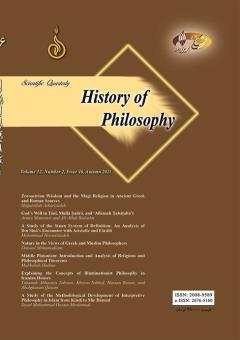Middle Platonism: Introduction and Analysis of Religious and Philosophical Theorems
Subject Areas : یافتههای جدید در سیر فلسفه باستان غرب (یونانی و یونانیمآبی)
1 - PhD in Comparative Studies of Religions, Islamic Azad University, Science and Research Branch, Tehran, Iran
Keywords: Middle Platonism, duality of the essence of divinity, descent of the soul, rational knowledge, resurrection,
Abstract :
Middle Platonism is one of the most important philosophical-religious schools of the first century BC. While claiming to revive the original Platonic school, it is rooted in the fundamental epistemological and philosophical theorems of that time including the essence of the One, God as Creator, descent of the soul, rational knowledge, and salvation. A study of middle Platonists’ works reveals that the philosophical principles of this school are mainly based on a reinterpretation of certain religious-philosophical theorems of Platonic, Stoic, Pythagorean, and gnostic schools. In fact, a clear trace of the concern for explaining the problem of the oneness and transcendence of the essence of Almighty, the quality of the creation of the world, and the presence of evil therein can be witnesses in the works of the philosophers that advocate the mentioned schools. The fundamental principles of middle Platonism are basically religious, and this school is mainly concerned with such topics as the duality of the essence of divinity in two concepts, God as the Maker or Creator of the world, the duality of the spiritual and material origin of Man and the descent of the soul, cosmology and the material structure and fate of the world, eschatology with an emphasis on the theorem of Man’s salvation through rational knowledge, and finally the discussion of ethics and the definition of its practical frameworks for attaining rational perfection, which is necessary for salvation. The present paper aims to explain and provide a comparative analysis of the principles and quality of the formation of the philosophical theorems of Middle Platonism as a philosophical-religious school.
Atticus (1981). Fragments, ed. E. Des Places, Paris: Collection Bude.
Bigg, Ch. (1968). The Christian Platonists of Aleuanderia. Oxford: Oxford University Press.
Bury, R. G. (1973). Introduction to the Timaues Epistle. In The Loeb Classical Library. Cambridge: Harvard University Press.
Cicero, (1972). De Natura Deorum Academica. The Classical Library. trans. H. Rackham. ed. E. H. Warmimgton. vol. 19. Cambridge: Harvard University Press.
Copleston, F. Ch. (1962). A History of Philosophy. vol. 1. New York: Image Books.
Dillon, J. (1977). The Middle Platonists. London: Duckworth.
Dillon, J. (1979). The Academy in the Middle Platonic Period. London.
Diogenes L. (1970). Lives of Eminent Philosophers. The Loeb Classical Library. trans. H. Rackham. ed. E. H. Warmimgton. vol.1. Cambridge: Harvard University Press.
Gersh, S. (1986). Middle Platonism and Neo Platonism: The Latin Tradition. Notre Dame: University of Notre Dame Press.
Hagg, H. F. (2006). Clement of Alexandria and the Beginnings of Christian Apophaticism. ed. G. C. Andrew Louth. Oxford: Oxford University Press.
Jonas, Hans (1963). The Gnostic Religion: The Message of the Alien God and the Beginnings of Christianity. Boston.
Naham, G. (1987). The Essential Philo. Leiden: Brill.
Philo (1958). On Dreams. The Loeb Classical Library. trans. F. H. Colson & G. H. Whitaker. ed. T. E. Page, vol. 5. Cabmbridge: Harvard University Press.
Philo (1966). on the Moses, 1.3. 13, in The Loeb Classical Library, trans. F. H. Colson, ed. T. E. Page, Cambridge, Harvard University Press.
Philo (1967). On the Eternity of the World. The Loeb Classical Library, trans. F. H. Colson and G. H. Whitkar, ed. E. H. Warmington. vol. 9. Cambridge: Harvard University Press.
Philo (1968). On the Giants. The Loeb Classical Library. trans. F. H. Colson and G. H. Whitaker, ed. E. H. Warmingtion. vol. 2. Cambridge: Harvard University Press.
Philo (1968). The Confusion of Tongues. The Loeb Classical Library. trans. F.H. Colson & G. H. Whitaker, ed. E. H. Warmington. vol. 4. Cambridge: Harvard University Press.
Philo (1968). The Unchangeableness of God. The Loeb Classical Library. trans. F. H Colson & G. H Whitaker, ed. E. H. Warmington. vol. 3. Cambridge: Harvard University Press.
Philo (1968). On the Posterity of Cain and His Exile. The Loeb Classical Library. trans. F. H. Colson & G.H.Whitaker, ed. T. E. Page, vol. 2. Cambridge: Harvard University Press.
Philo (1976). On the Account of the Word’s Creation. The Loeb Classical Library. trans. F. H. Colson & G. H. Whitaker. ed. T. E. Page, vol. 1. Cabmbridge: Harvard University Press.
Plato (1975). The Epinumeas. The Loeb Classic Libeary trans. R. G. Bury. ed. G. p. Good. Cambridge: Harvard University Press.
Plato (1953). The Republic. The Loeb Classical Library. trans. P. Shorey. ed. T. E. Page. Cambridge: Harvard University Press.
Plato (1975). The Timaues Epistle. The loeb Classica library. trans. R. G. Bury, ed. G. P. Good. Cambridge: Harvard University Press.
Runia, D. (1986). Philo of Alexandria and the Timaeus of Plato. Leiden: Brill.
The Apocryphon of John (1984). Nag Hammadi Library in English. trans. F. Wisse. ed. J. Robinson. New York: Leiden.
Tredennick, H. (1956). Introduction of the Metaphysics. The Loeb Classical Library. trans. H. Tredennick , ed. T. E. Page, Cambridge: Harvard University Press.
Wolfson, H. A. (1982). Philo: Fundation of Religious Philosophy in Judaism, Christianity and Islam. Cambridge: Harvard University Press.


